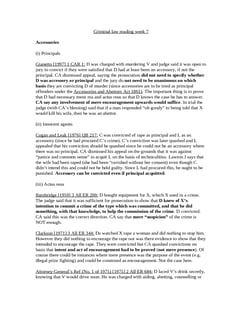Judgement for the case R v Clegg
Table Of Contents
KEY POINTS
The need for legal reform in cases of self-defense involving the use of excessive force resulting in death is a subject of ongoing debate and discussion within the legal community and among policymakers. The specific circumstances and outcomes can vary depending on jurisdiction and individual cases, making it a complex and evolving area of law.
FACTS
The appellant, a soldier on patrol in Northern Ireland, encountered a speeding stolen car during their mission to apprehend joyriders. The soldier fired three shots at the car's windscreen in what they claimed was self-defense or defense of a colleague. Subsequently, a fourth shot was fired after the car had passed, fatally injuring one of the passengers.
The appellant faced a murder charge. The trial judge, in a non-jury trial, accepted the defense's argument regarding the first three shots but concluded that the fourth shot had been a deliberate and aimed act with the intent to cause death or serious harm. Since the danger had dissipated when the car moved away, the judge convicted the appellant of murder.
The Court of Appeal in Northern Ireland upheld the conviction, citing the excessive and disproportionate use of force in the shot that caused the passenger's death. They certified a crucial legal question for consideration: whether a soldier on duty, possessing the intent for murder but claiming self-defense, albeit with excessive force, should be charged with murder or manslaughter.
The appellant subsequently appealed to the higher court.
JUDGEMENT
The appeal is dismissed.
In cases where an individual employs a level of force in self-defense that exceeds what is warranted by the circumstances, they are to be held accountable for murder. There exists no differentiation between the application of excessive force in self-defense and the application of excessive force in the prevention of a crime or in the apprehension of an offender.
The fact that the person employing such force is a soldier or a police officer acting within the scope of their duty does not alter this principle.
COMMENTARY
The appellant, a soldier in Northern Ireland, fired shots at a speeding stolen car, claiming self-defense. One shot fired after the car passed killed a passenger. The appellant was convicted of murder, which the Court of Appeal upheld due to excessive force.
They raised a legal question: should a soldier charged with murder, who claims self-defense with excessive force, be charged with murder or manslaughter? The appeal was dismissed, affirming that excessive force in self-defense constitutes murder, regardless of the person's role as a soldier or police officer.
ORIGINAL ANALYSIS
Defendant was a soldier on duty in NI. A car drove at him in the street and he fired 3 shots at the windscreen. He got out the way of the car and, once the car had passed, fired a fourth shot which killed a passenger.
Judge and CA accepted that first 3 shots were fired in self-defence but that the final shot was not in self defence since Defendant was no longer posed any danger by the car.
For the same reason HL dismissed the appeal, saying that where a greater degree of force was used than was reasonable to defend oneself, self-defence does not apply.
It also makes no difference whether Defendant is a private citizen or a policeman/soldier carrying out their duty.
For Further Study on R v Clegg
Need instant answers? Our AI exam tutor is here to help.
Ask questions 🙋 Get answers 📔 It's simple 👁️👄👁️
Our AI is educated by the highest scoring students across all subjects and schools. Join hundreds of your peers today.
Get StartedRelated Product Samples
These product samples contain the same concepts we cover in this case.
| Criminal Law | Defences Notes (32 pages) |
| Criminal Law | Defences Short Notes (28 pages) |
| Criminal Law | Homicide Notes (20 pages) |

 Since 2010, Oxbridge Notes has been a trusted education marketplace, supplying high-quality materials from top achievers at universities like Oxford, Cambridge, LSE, Harvard, and Yale.
Since 2010, Oxbridge Notes has been a trusted education marketplace, supplying high-quality materials from top achievers at universities like Oxford, Cambridge, LSE, Harvard, and Yale.